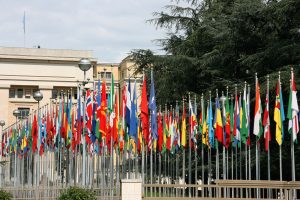A treaty to address crimes against humanity globally has been under discussion for a decade. Next week in New York, states have a key opportunity to move towards turning it into a reality, and those from the Asia-Pacific region have a crucial role to play.
The general need for this treaty is beyond doubt. No region of the world is free from crimes against humanity. In the past 10 years alone, Amnesty International found such atrocities in at least 18 countries in all parts of the world. The Asia-Pacific has its share of experiences, spanning from the past – Japan, Cambodia, Timor-Leste, and Sri Lanka – to the present: Afghanistan, Xinjiang in China, Myanmar’s treatment of the Rohingya and other populations, the Philippines in its “war on drugs.”
At the beginning of April, a committee of the United Nations General Assembly will meet to discuss a proposed international response to this scourge. What may seem like a technical exercise for specialists is in fact a major chance to improve the global framework for international justice. It is absolutely necessary that Asian and Pacific states – and civil society there – engage with this process and contribute to the shaping of an important issue in international law.
In this session, U.N. member states will look again in detail at a draft text adopted in 2019. The meeting is crucial for discussing specific elements of the proposed treaty and its future overall. This is because the same committee is to decide by the end of this year whether formal negotiations should be opened on a future Convention for the Prevention and Punishment of Crimes against Humanity.
This treaty would fill a gaping hole in the global framework of international justice. There are the Geneva Conventions and their protocols on war crimes, and the Genocide Convention, which has recently acquired a key role in the context of the conflict in Gaza, but none for crimes against humanity.
These crimes, which unlike war crimes can occur outside of armed conflicts, do fall under the jurisdiction of the International Criminal Court (ICC). But that court in principle only tries cases involving its member states, and the few cases the ICC can and will take on address the criminal responsibility of specific individuals, not state wrongdoing.
The proposed convention would offer additional pathways for states to promote justice, truth, and reparation for victims and survivors of crimes against humanity. It would add duties to prevent such crimes and rules on how to cooperate with other states. And it would state an obligation to investigate and prosecute suspected perpetrators of any crime against humanity wherever they are found, unless they are extradited for prosecution elsewhere, thereby reducing safe havens.
A foundational element of this new convention would be that it is primarily directed at enabling states, not a new international court. It would provide a “toolbox” for state authorities to do their own investigations, whether of atrocities committed in their own or other countries. States concerned that prosecutions in international institutions like the ICC are subject to double standards would be given a framework to do it themselves, with common core definitions and principles, to be applied by domestic courts.
All of this means that Asia-Pacific states should have a genuine interest in improving accountability for perpetrators and justice for victims.
However, the recent engagement of states from Asia-Pacific in this process has been disappointing. In the last round of consultations, only six regional countries provided written comments: Afghanistan, Australia, and New Zealand expressed support for adopting a convention; Japan, while generally supportive, expressed some reservations, as did Singapore; China opposed the whole project.
Last October, some regional states made or joined statements as part of at least 110 countries globally supporting a treaty. Thailand was one of the most explicit, stating at the time that it was “positively considering” the convention.
This April, those in the region supporting a future convention on crimes against humanity must clearly express their desire to move forward, lest they risk being sidelined by states masking their opposition in calls for more discussions, delays and “consensus.” Regional civil society must call on their governments to do what is right in the fight against impunity.
This convention has been under discussion for over a decade. The drafters of the proposed treaty, from all regions of the world, have provided an excellent starting point. That disagreements on specific provisions exist is just one more reason to now move to actual negotiations.
The Asia-Pacific once marked novel approaches to international justice, with special chambers addressing crimes against humanity in Cambodia and Timor-Leste. This U.N. General Assembly committee meeting is a chance for Asia-Pacific governments to put on record how they today want to advance justice for crimes that, as the draft text says, “deeply shock the conscience of humanity.” It should not be wasted.

































